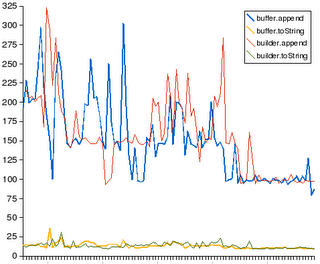To test the relative performance differences, I used a BufferedReader over decently sized text file (622732 words gathered by repeatedly pasting the wikipedia document on USA). Armed with data, I wrote and measured the following loops that merely read in the file and appended to either a StringBuffer or a StringBuilder.
....
for (int x=0; x<100; x++) {
File f = new File("USA.txt");
BufferedReader in = new BufferedReader(new InputStreamReader(new FileInputStream(f)));
String line = "";
StringBuffer sb = new StringBuffer();
// StringBuilder sb = new StringBuilder();
long start = System.currentTimeMillis();
while ((line = in.readLine()) != null) {
sb.append(line);
}
long mid = System.currentTimeMillis();
String s = sb.toString();
long done = System.currentTimeMillis();
System.out.println((mid - start) + " " + (done - mid));
in.close();
}
...
As evident, I merely switched the constructor to a StringBuilder when I was done. The measurement dumps out the total file read and append times as well as to hit on the toString method.

Clearly, they both perform on almost the same lines. At Java One last year, there was lots of talk about how well the Sun VM was handling synchronization. This is proof.
But here's the dicey part. When we did a mass search and replace on our application, we found a massive boost. So, were we dreaming?
I was convinced that my findings were bogus, and that the overhead imposed by the readLine call on my measurement was hiding a performance difference. I was wrong. I changed the loop to measure like so:
...
long read = 0;
while ((line = in.readLine()) != null) {
long t1 = System.currentTimeMillis();
sb.append(line);
long t2 = System.currentTimeMillis();
read += (t2 - t1);
}
...
No difference. I'm happy about this because we need not start hunting down StringBuffer and switching it to StringBuilder like crazy. But, I'm perplexed about what we saw earlier. So, I decided to try and execute the same test on a JRockit VM (1.5 spec). Here's what I got:

JRockit seems to jump in performance steps- almost like the VM is adjusting to the code. Notice the step like decrease in append times for both the buffer and the builder, and the toString is clearly faster than Sun. But, there's something to be said for the sheer predictability of the Sun VM too.
So, my conclusion? Don't race to switch StringBuffer to StringBuilder- there doesn't seem to be a real tangible difference in performance.
No comments:
Post a Comment